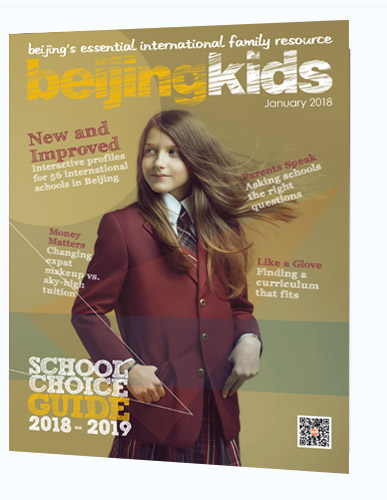The Jin family consists of Jin Leili (father), Zhang Yuhong (mother), and Jin Churong (14, nickname Niuniu). Yuhong received her MBA education abroad, and after experiencing the huge difference between Chinese and western education systems, she chose an international school over a public one for her child. At the same time, she wants her child to also have the chance to learn Chinese and have access to classic Chinese literature such as song lyrics and Yuan verse. The bilingual curriculum Beijing International Bilingual Academy (BIBA) offers exactly meets her demands. Niuniu started at age 4 in BIBA and has been enjoying her school life there very much. BIBA for her is not just a school but her second home. The advantage of the Bilingual approach in education stands out obviously after Grade 5, when both Niuniu’s Chinese and English levels were good enough to be considered as her first language. Western education systems attach more attention to developing a student’s unique perspectives. The decade-long learning process under a bilingual curriculum has gradually influenced Niuniu’s way of thinking, and her understanding of Chinese and western culture has been shaped accordingly.
Favorite part of school life
Science class and band practice. I’m currently in our school’s chamber music ensemble, and my own student-led band plays classical music.
Best project/activity that you’ve done
My research report for last year’s science fair on quantum mechanics.
How has learning two languages affected your life?
It makes more books from different cultures accessible to me, also adds variety to my perspectives and makes my views better rounded.
A bilingual project that you really want to do in the future
A project for funding and raising awareness for the issue in my Global Perspectives course. Hopefully, by doing this, more people will understand the importance of protecting the environment.
Do you keep a bilingual journal/diary?
I have a journal, written mainly in English, but there is some Chinese embedded throughout.
Curriculum Spotlight: Bilingual Education
“Bilingual” isn’t a curriculum in itself but is an approach used by numerous schools to deliver instruction. Parents should note that for a native pronunciation, learning must take place before age 7. While fluency can be achieved at any age, the feat becomes harder as a child or adult grows older and if motivation wanes at any point.
What’s unique about a bilingual education?
A bilingual education seeks to put two languages in the part of the brain that considers a language as primary. This means the language is used as a skill rather than a subject. A good bilingual program will include both culture and language in multiple subjects, as the two can’t be separated, and using both languages beyond studying grammar and topical vocabulary.
How is it applied?
The split between languages can be 50:50, 30:70, with co-teachers, split-days, or in rare cases, simultaneous teaching. Trilingual education might be available in some programs, such as Eduwings, where German is included. If a parent is committed to providing an academic atmosphere at home with the child’s native and home language, an immersion program can be created by sending an English-speaking child to a Chinese-only program, for example.
How well does this education system prepare students for the real world?
Many mid-manager jobs in international companies across the world require bilingualism as a minimum requirement. Another issue parents’ face is that children might become bilingual, but not bi-literate.
Where is it offered?
Many schools claim to be bilingual, when in fact the program offered is actually second language learning. A Chinese kindergarten might claim to be an English bilingual school, but English is taught as a subject or foreign language, with students meeting to speak and learn in English for only a forty minute period, five days a week or less.
Photo: Dave’s Studio
This article originally appeared on p16-17
of beijingkids School Choice Guide 2018-2019.





